

I think thinking critically is at the heart of anybody transforming their life and I really believe that a person who thinks critically, who, you know, may be extraordinarily disadvantaged, materially, can find ways to transform their lives, that can be deeply and profoundly meaningful in the same way that someone who maybe incredibly privileged materially and in crisis in their life may remain perpetually unable to resolve their life in any meaningful way if they don't think critically."
- Bell Hooks. Check your sources. How To Tell Fake News From Real News In 'Post-Truth' Era. Behind the fake news crisis lies what's perhaps a larger problem: Many Americans doubt what governments or authorities tell them, and also dismiss real news from traditional sources.
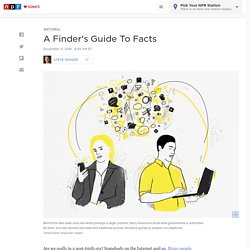
But we've got tips to sharpen our skepticism. Turnbull/Getty Images/Ikon Images hide caption toggle caption Turnbull/Getty Images/Ikon Images. Fake News Antidote: Teaching Kids To Discern Fact From Fiction : NPR Ed. By now, you've probably heard about one very real consequence of fake news — the infamous "pizzagate" conspiracy theory that ended with Edgar Welch, 28, firing a real gun inside a real Washington, D.C., pizzeria filled with real people.
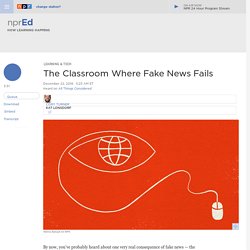
When The New York Times later asked Welch what he thought when he realized there were no child slaves inside the restaurant, as one fake news story had led him to believe, he responded: "The intel on this wasn't 100 percent. " Welch isn't the only one struggling to tell fact from fiction in this digital age. Bell Hooks Pt 1 Cultural Criticism and Transformation. Critical Thinking VALUE Rubric. Cognitive Tutor - Carnegie Learning. Focus on individual students' needs with software that customizes feedback, hints, and prompts within each problem.
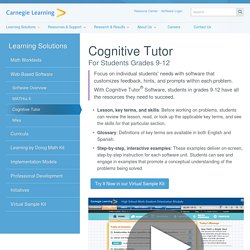
With Cognitive Tutor® Software, students in grades 9-12 have all the resources they need to succeed. Lesson, key terms, and skills: Before working on problems, students can review the lesson, read, or look up the applicable key terms, and see the skills for that particular section. Glossary: Definitions of key terms are available in both English and Spanish. Step-by-step, interactive examples: These examples deliver on-screen, step-by-step instruction for each software unit. Students can see and engage in examples that promote a conceptual understanding of the problems being solved. Try It Now in our Virtual Sample Kit Cognitive Tutor software gives each student a different experience by offering just-in-time feedback and hints.
On-demand hints: Hints are contextual and oriented toward helping the student solve key steps in the problem. Technical Requirements Available Courses. Towards a Rationale of Audio-Text. Bauman 1975 Bauman, R.
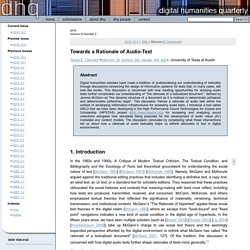
"Verbal Art as Performance. " In American Anthropologist, New Series, 77, no. 2 (June 1975): 290-311. Bernstein 2011 Bernstein, C. Attack of the Difficult Poems: Essays and Inventions. University Of Chicago Press, 2011. New Reasons to Dislike Multiple-Choice Testing. The multiple-choice problem is becoming a bit of an issue.
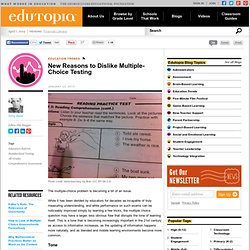
While it has been derided by educators for decades as incapable of truly measuring understanding, and while performance on such exams can be noticeably improved simply by learning a few tricks, the multiple choice question may have a larger, less obvious flaw that disrupts the tone of learning itself. This is a tone that is becoming increasingly important in the 21st century as access to information increases, as the updating of information happens more naturally, and as blended and mobile learning environments become more common.
Solving Real-World Issues Through Problem-Based Learning. Elements of Thought. FOUNDATION TRANSCRIPT. Implications and Consequences in Critical Thinking. Welcome to the Virtual Crash Course in Design Thinking. Welcome to the d.school’s Virtual Crash Course resource page!
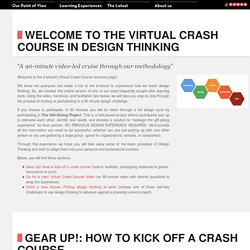
Derek Cabrera - How Thinking Works. How to think, not what to think. What is the Scientific Method'? Next: What is the difference Up: The scientific method Previous: The scientific method The scientific method is the best way yet discovered for winnowing the truth from lies and delusion.
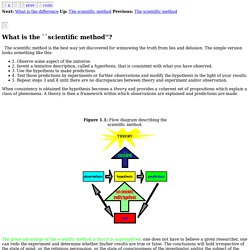
The simple version looks something like this: 1. Observe some aspect of the universe. 2. Invent a tentative description, called a hypothesis, that is consistent with what you have observed. 3. When consistency is obtained the hypothesis becomes a theory and provides a coherent set of propositions which explain a class of phenomena. The great advantage of the scientific method is that it is unprejudiced: one does not have to believe a given researcher, one can redo the experiment and determine whether his/her results are true or false. Belief that does not rest on logical proof or material evidence, does not determine whether a scientific theory is adopted or discarded. Cognition and Instruction/Problem Solving, Critical Thinking and Argumentation.
We are constantly surrounded by ambiguities, falsehoods, challenges or situations in our daily lives that require our Critical Thinking, Problem Solving Skills, and Argumentation skills.
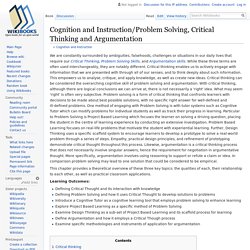
Critical thinking. The analysis of facts to form a judgment History[edit] The earliest documentation of critical thinking are the teachings of Socrates recorded by Plato.
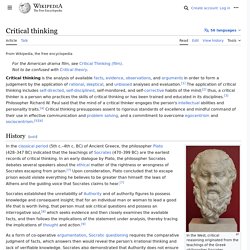
Socrates established the fact that one cannot depend upon those in "authority" to have sound knowledge and insight. He demonstrated that persons may have power and high position and yet be deeply confused and irrational. He established the importance of asking deep questions that probe profoundly into thinking before we accept ideas as worthy of belief. Untitled.